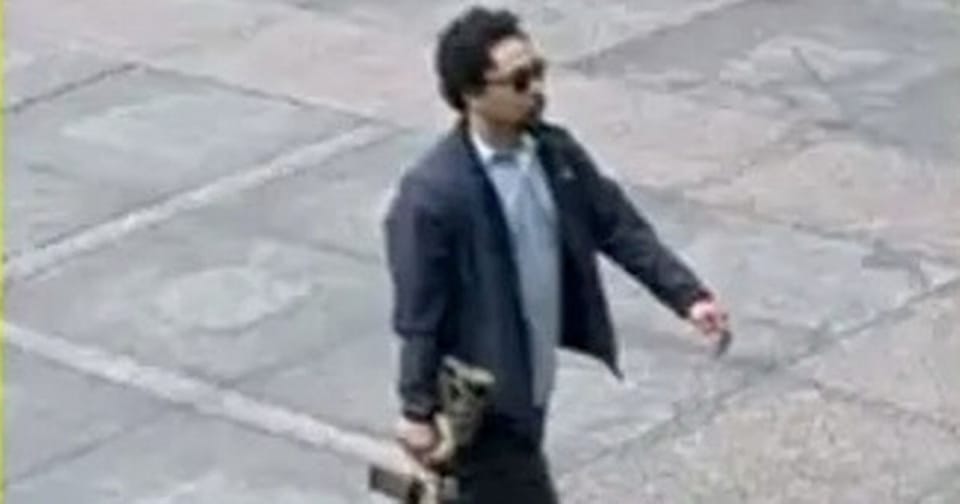The D.C. Police Takeover Lawsuit

On Friday, August 15, 2025, D.C. Attorney General Brian Schwalb filed a federal lawsuit challenging President Trump's takeover of Washington's police department. The case centers on Trump's use of Section 740 of the D.C. Home Rule Act to place the Metropolitan Police under federal control after a savage carjacking attack on a former government staffer.
At 3 a.m. on August 3, 2025, Metropolitan Police reports show approximately 10 teenagers approached a car in Washington's Logan Circle and attempted to carjack it. The victim was Edward "Big Balls" Coristine, a 19-year-old former Department of Government Efficiency staffer who was with his girlfriend. When the teenagers made comments about taking their vehicle, Coristine pushed his companion into the car for safety and confronted the group. The teenagers brutally beat him until patrol officers arrived, leaving him bloodied with a black eye, concussion, and broken nose. Two 15-year-olds from Maryland were arrested and charged with unarmed carjacking.
Trump shared a graphic photo of the bloodied Coristine on Truth Social, writing: "If D.C. doesn't get its act together, and quickly, we will have no choice but to take Federal control of the City."

On August 11, Trump made good on that threat, invoking Section 740 of the D.C. Home Rule Act to place the Metropolitan Police under federal control and deploying 800 National Guard troops. Attorney General Pam Bondi named DEA Administrator Terry Cole as emergency police commissioner. Three days later, Schwalb filed his lawsuit challenging what he called an unlawful "hostile takeover."
What makes this case extraordinary isn't just the unprecedented use of federal emergency powers, but the remarkable background of the crime victim whose attack triggered the federal intervention. Investigative research by journalist Jacob Silverman reveals Edward Coristine is the grandson of Valery Fedorovich Martynov, a KGB lieutenant colonel who became one of America's most valuable Cold War double agents. Historical intelligence records show Martynov was sent to Washington in 1980 as a KGB technical espionage officer working undercover at the Soviet Embassy. In April 1982, the FBI recruited him as Agent "Gentile," and he began providing detailed information about KGB operations, including identities of Soviet spies in the U.S.
Martynov's intelligence helped the FBI and CIA identify and neutralize Soviet operations, making him one of the most valuable double agents of his time. But his double agent status was exposed when CIA officer Aldrich Ames betrayed him to the Soviets. The KGB used deception to bring Martynov back to Moscow as an escort for returning Soviet defector Vitaly Yurchenko. Upon arrival, Martynov was arrested and executed on May 28, 1987. His widow, Natalya Martynova, later emigrated to the United States with their children, including Anna, who married Charles Coristine.
The Coristine family story represents a remarkable journey from Cold War sacrifice to American entrepreneurial success. Business records and CNBC reporting show Charles Coristine built one of the most successful snack food companies in America after burning out from nearly two decades as a Wall Street trader at Morgan Stanley and TD Bank. In November 2011, documents reviewed by CNBC show Coristine bought the failing LesserEvil snack company for $250,000 from his savings. The company was hemorrhaging money with less than $1 million in annual revenue at the time.
Under Charles Coristine's leadership, company data shows LesserEvil grew to $103.3 million in annual gross sales by 2023, including $82.9 million in net sales and $14.4 million in EBITDA. In April 2025, business news reports confirm Hershey announced a deal to acquire LesserEvil for $750 million, plus performance milestone payments. Edward Coristine, who worked briefly at Neuralink before joining DOGE as one of the youngest staffers, resigned from DOGE in June 2025 and took a position at the Social Security Administration to work on website improvements.
The attack on someone whose grandfather died helping America defeat the Soviet Union and whose father built a three-quarter-billion-dollar business triggered a federal response that pitted two fundamentally opposing approaches to law enforcement against each other. Public records show D.C. Attorney General Brian Schwalb graduated from Duke University and Harvard Law School, then became partner-in-charge of Venable LLP's D.C. office after working in the DOJ Tax Division. His official biography shows Schwalb's private practice included "advocating for people injured by excessive, unconstitutional police force," emphasizing civil rights litigation against police departments rather than criminal prosecution.
In stark contrast, Department of Justice records show Attorney General Pam Bondi brings what may be the most extensive criminal prosecution experience of any U.S. Attorney General in history. Born in Tampa, Florida, Bondi spent 18 years as a prosecutor in Hillsborough County handling cases "ranging from domestic violence to capital murder" before serving as Florida's Attorney General from 2011-2019. When she took office in Florida, DOJ records show the state was called "the pill mill capital of the United States" with 98 of the top 100 oxycodone dispensers in the country operating there. In her first legislative session, official records show Bondi passed legislation that shut down all 98 of these operations completely.
Heritage Foundation analysis states: "Pam Bondi is the most experienced career criminal prosecutor ever slated to be the chief law enforcement officer of the United States. None of the prior U.S. Attorneys General spent 18 years as a local criminal prosecutor handling every type of case from domestic violence to homicide." The contrast between Schwalb's background suing police and Bondi's experience prosecuting criminals alongside police represents the fundamental philosophical war between coddling criminals and actually stopping them.
Trump's choice of DEA Administrator Terry Cole as emergency police commissioner brings exceptional qualifications to D.C.'s crime problems. Official DEA records show Cole has more than 31 years of law enforcement experience, including 22 years at the DEA with domestic assignments in Oklahoma, New York, and Washington, D.C., plus international missions in Colombia, Afghanistan, Mexico, and the Middle East. His biography shows Cole served as Chief of Staff and Executive Officer at the DEA's Special Operations Division and was Acting Regional Director overseeing operations in Mexico, Canada, and Central America before retiring in 2020. Most recently, Cole served as Virginia's Secretary of Public Safety and Homeland Security under Governor Glenn Youngkin from 2023 to 2025.
The federal intervention comes amid significant discrepancies in D.C. crime statistics that raise questions about data integrity. Official White House statements show "So far in 2025, there have already been nearly 1,600 violent crimes and nearly 16,000 total crimes reported in Washington, D.C." and note "Carjackings increased 547% between 2018 and 2023." However, a January 2025 Department of Justice press release states "Total violent crime for 2024 in the District of Columbia is down 35% from 2023 and is the lowest it has been in over 30 years."
Crime analyst Jeff Asher highlights this discrepancy, noting "DC's open data is likely overstating the degree of the city's decline in violent crime right now" and pointing to "just how sharply the decline in MPDC's public data differs from the decline reported by DC to the FBI." Asher's analysis shows while D.C.'s public data suggests a 35% drop in violent crime for 2024, the FBI's data shows only a 9% drop. Federal intervention could potentially address these statistical inconsistencies by establishing direct oversight of crime reporting.
Beyond the immediate policing issues, reports show Bondi made significant institutional changes on her first day as Attorney General, shutting down "the FBI's Foreign Influence Task Force, DOJ's Task Force KleptoCapture, and cutting back enforcement of the Foreign Agents Registration Act." The Foreign Influence Task Force was established after the 2016 election to address disinformation operations and foreign election interference. Bondi's memorandum called for limiting FARA cases to "more traditional espionage" and ending the task force to "free resources" for more urgent matters.
The legal challenge faces significant constitutional hurdles that may doom Schwalb's lawsuit from the start. Constitutional law experts at The Heritage Foundation argue the case represents a legal impossibility under Article III of the Constitution because D.C.'s challenge constitutes "the United States suing itself." Since common law precedent shows "a person couldn't sue himself" and federal courts require genuine "cases or controversies," the lawsuit may lack the constitutional standing required for federal judicial review.
Article I, Section 8, Clause 17 grants Congress power "To exercise exclusive Legislation in all Cases whatsoever, over such District (not exceeding ten Miles square) as may, by Cession of particular States, and the Acceptance of Congress, become the Seat of the Government of the United States." Constitutional experts argue this provision creates complete federal authority over D.C., with the Home Rule Act of 1973 representing congressional delegation of authority rather than constitutional limitation on federal power. Heritage Foundation analysis states: "The District owes its existence to Article I of the Constitution, which grants Congress authority to 'exercise exclusive Legislation in all Cases whatsoever' over the 'Seat of Government.' Congress has retained this plenary control" even under home rule.
Legal experts note Section 740 of the D.C. Home Rule Act grants the president authority to use D.C.'s Metropolitan Police for "federal purposes" when he "determines that special conditions of an emergency nature exist." Historical analysis shows this provision existed for over 50 years but was never invoked until Trump's action in August 2025. The law requires presidential notification to Congress within 48 hours and limits federal control to 30 days unless Congress approves an extension, but the emergency determination requires only presidential judgment, not judicial approval or congressional pre-authorization.
The constitutional analysis indicates this lawsuit is doomed from the start due to insurmountable standing issues. This confrontation ultimately tests federal constitutional authority over the nation's capital, with outcomes that could affect future federal-local power relationships nationwide. The extraordinary personal stories involved, from Valery Martynov's ultimate sacrifice for American freedom to his grandson's attack triggering federal intervention, demonstrate how individual events can catalyze broader constitutional and institutional changes that reshape the balance of power in American government.



